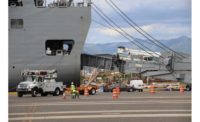After months of struggle to restore power in Puerto Rico, the territory’s Gov. Ricardo Rosselló on Jan. 22 announced that the state-owned Puerto Rico Electric Power Authority will be privatized.
“The Puerto Rico Electric Power Authority [PREPA] has become a heavy burden on our people, who are now hostage to its poor service and high cost,” Rosselló said in a statement. “What we know today is the Puerto Rico Electric Power Authority does not work and cannot continue to operate like this.” Rosselló was expected to present a privatization plan to the territory’s Legislature as early as Jan. 24. The sell-off process could take as long as 18 months.
The problems with the utility, which was $9 billion in debt before Hurricane Maria struck the island, are just some of the challenges facing Puerto Rico and its recovery. More than 16% of the commonwealth’s power is still not operational, and at least 7% of its residents don’t have water service.
Other issues include AECOM’s formal challenge for a contract for emergency repairs, the federal government with-holding $1 billion of emergency loan funding, and Puerto Rican authorities’ and unions’ claim the U.S. Army Corps of Engineers seized a stash of materials at gunpoint on Jan. 6, a narrative the Corps disputes.
“It was not a seizure. That was a false narrative. We got consent from PREPA to enter the warehouse. We were not armed,” says Col. John P. Lloyd, USACE commander, Pittsburgh District. Lloyd claims that, after touring a warehouse with PREPA, the Corps took inventory and distributed the needed materials to contractors. The Corps told ENR it had access to the site, but it wasn’t provided with an inventory of materials in Warehouse 5 until Jan. 6, when the Corps itself made one during a joint visit with PREPA. Lloyd says that U.S. and Puerto Rico-based linemen have struggled with a lack of equipment as they restore power in Puerto Rico.
Union officials agree about the lack of materials but disagree about the Corps’ motive. “Warehouse 5 was an action of the Corps of Engineers with the sole intention of diverting attention to the criticism of their slowness in handling materials and in the hiring they have done,” says Freddyson Martínez, vice president of the Irrigation & Electrical Workers Union. Rosselló has requested that the Dept. of Justice investigate the event.
Despite the controversies, progress is being made. As of Jan. 23, 84.5% of PREPA customers have electricity, 93% of water customers have water, and 98% of telecommunications are functional, according to Puerto Rico’s recovery-status website. Corps teams have removed 2.3 million cu yd of the 6.2 million cu yd of debris and installed 1,031 of the 1,129 requested generators and more than 45,471 of the 68,895 temporary blue roofs.
By comparison, the Corps installed 310 generators for temporary power in Katrina and 40 for Harvey, says Lloyd.
As power restoration moves forward, so does reconstruction, but even that has problems. AECOM filed an official challenge to a $133-million contract that FEMA awarded to AECOM’s competitor, Adjusters International, Utica, N.Y.
AECOM says Adjusters International’s bid doesn’t meet requirements. The award is to manage emergency repairs for 75,000 hurricane-damaged homes in the country.
“As the highest-ranked bid, we strongly believe that our proposal represents the best value and that we should be awarded the contract,” said Vahid Ownjazayeri, executive vice president of AECOM-CPM Joint Venture, in a statement. AECOM’s bid came in $20 million higher than its competitor. Adjusters International did not respond with a request for comment.
As contractors compete for the award, federal and local bureaucrats are trying to pin down who will foot the overall bill. Puerto Rico officials publicly announced that the country’s utility companies would run out of money in January, yet federal officials said the territorial government has a cash balance of $1.5 billion and is postponing the award of a $4.9-billion emergency loan, approved by Congress.





